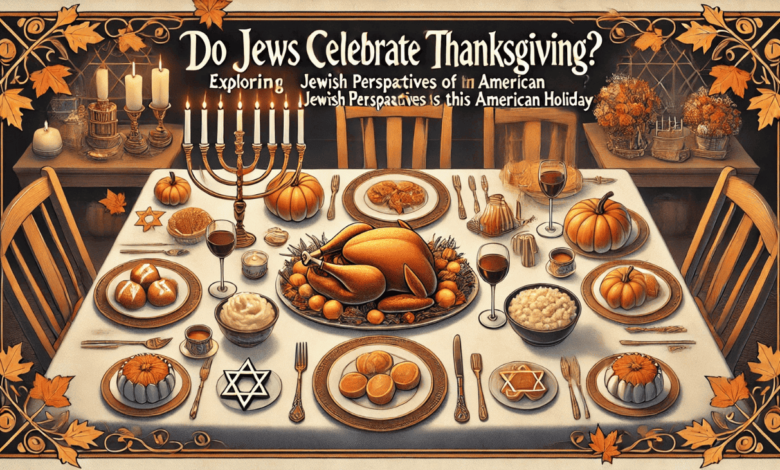Do Jews Celebrate Thanksgiving? Exploring Jewish Perspectives on This American Holiday

Thanksgiving is a widely cherished American holiday centered around gratitude, family, and a bountiful feast. But when it comes to religious and cultural traditions, people often wonder: do Jews celebrate Thanksgiving? The answer is not a simple yes or no. While Thanksgiving is a secular holiday, Jewish perspectives on it vary based on religious observance, cultural identity, and historical considerations.
Is Thanksgiving a Religious Holiday?
One of the reasons many Jewish families embrace Thanksgiving is that it is not a religious holiday. Unlike Christmas or Easter, Thanksgiving is rooted in American history and does not have overtly Christian themes. Instead, it focuses on gratitude, unity, and the celebration of blessings, which are deeply ingrained in Jewish values. The Hebrew Bible and Jewish prayers emphasize gratitude, with daily blessings thanking God for food, shelter, and life itself. Because of this natural alignment, many Jewish families see Thanksgiving as an extension of their spiritual practice of giving thanks.
Historical Jewish Perspectives on Thanksgiving
Historians suggest that Thanksgiving may have some indirect Jewish connections. The Pilgrims, who celebrated the first Thanksgiving in 1621, were heavily influenced by the Old Testament. Some scholars believe that Thanksgiving was modeled after Sukkot, the Jewish festival of harvest and gratitude. Sukkot, which lasts a week, is a time when Jewish families build temporary outdoor structures (sukkahs) and celebrate nature’s bounty—concepts similar to the early Pilgrims’ feast.
Moreover, Jewish immigrants who arrived in America in the late 19th and early 20th centuries often saw Thanksgiving as a way to integrate into American society while maintaining their Jewish identity. It was one of the few American holidays that did not conflict with Jewish traditions, making it easy for Jewish families to embrace.
Do Orthodox Jews Celebrate Thanksgiving?
Jewish observance of Thanksgiving varies across different communities.
Reform and Conservative Jews
These communities widely celebrate Thanksgiving. Many Reform and Conservative Jewish families see it as a cultural holiday and incorporate Jewish traditions into the meal. Some recite the Ha-Motzi (the blessing over bread) before eating, while others add the Shehecheyanu prayer, which is said when experiencing something new or joyful.
Modern Orthodox Jews
Many Modern Orthodox Jews celebrate Thanksgiving but may modify certain aspects of the holiday to align with Jewish dietary laws (kashrut). A kosher Thanksgiving meal, for example, may replace turkey stuffing with a non-dairy alternative or feature pareve (neutral) desserts that do not mix dairy and meat.
Ultra-Orthodox (Haredi) Jews
Some Haredi communities do not celebrate Thanksgiving at all. They may view it as a non-Jewish custom or believe that Jews should not adopt secular traditions that are not part of the Torah. Others may acknowledge the holiday but treat it as an ordinary day, focusing instead on Jewish holidays for expressions of gratitude.
Jewish Thanksgiving Traditions
For Jewish families who do celebrate Thanksgiving, there are unique ways to blend American and Jewish customs. Some ideas include:
- Saying a special prayer of gratitude – Many families incorporate Psalms or a Jewish blessing before the meal.
- Lighting Shabbat candles – If Thanksgiving falls close to Friday night, families may include a traditional Shabbat candle-lighting ceremony.
- Tzedakah (charity) – Since Jewish teachings emphasize giving back, some Jewish families use Thanksgiving as an opportunity to volunteer or donate to those in need.
- Incorporating Jewish foods – Some Jewish families add challah, kugel, or matzo ball soup to their Thanksgiving feast.
Does Thanksgiving Conflict with Jewish Law?
One question that arises among more observant Jews is whether Thanksgiving is considered a “forbidden” holiday under Jewish law. Unlike religious holidays such as Christmas, Thanksgiving is generally not seen as problematic because it does not have religious roots. However, Jewish law prohibits creating new holidays that resemble religious observances. Some rabbis argue that celebrating Thanksgiving annually with a festive meal could make it appear like a religious tradition, which Orthodox Jews tend to avoid.
To address this concern, some Orthodox Jewish families mark Thanksgiving in a simpler way—perhaps by expressing gratitude through prayer rather than holding a large feast. Others may choose to enjoy the day with family without viewing it as a holiday at all.
FAQ: Do Jews Celebrate Thanksgiving?
Is Thanksgiving considered a Jewish holiday?
No, Thanksgiving is a secular American holiday, not a Jewish religious holiday. However, many Jewish families celebrate it because of its focus on gratitude, which aligns with Jewish teachings.
Do all Jews celebrate Thanksgiving?
Not all Jews celebrate Thanksgiving. Reform and Conservative Jews are more likely to observe the holiday, while some Orthodox and ultra-Orthodox Jews may choose not to celebrate it due to religious reasons.
Is it okay for Jews to eat turkey on Thanksgiving?
Yes, turkey is kosher, so observant Jews can eat it as long as it is prepared according to kosher dietary laws.
Is Thanksgiving similar to any Jewish holiday?
Yes, Thanksgiving has similarities to Sukkot, the Jewish harvest festival. Both holidays emphasize gratitude for the harvest and the blessings of life.
Do Jews incorporate Jewish customs into Thanksgiving?
Many Jewish families incorporate traditions such as saying blessings over food, lighting candles if Thanksgiving falls near Shabbat, and adding Jewish foods to their meal.
Conclusion: A Personal Choice for Jewish Families
So, do Jews celebrate Thanksgiving? The answer depends on the individual and their level of religious observance. Many Jewish Americans celebrate Thanksgiving as a secular holiday, appreciating the opportunity to give thanks, gather with loved ones, and enjoy a festive meal. Others, particularly in Orthodox circles, may approach it with caution or refrain from celebrating it altogether. Ultimately, Thanksgiving’s themes of gratitude, family, and community resonate with Jewish teachings, making it a holiday that many Jewish people feel comfortable observing in their own way.



